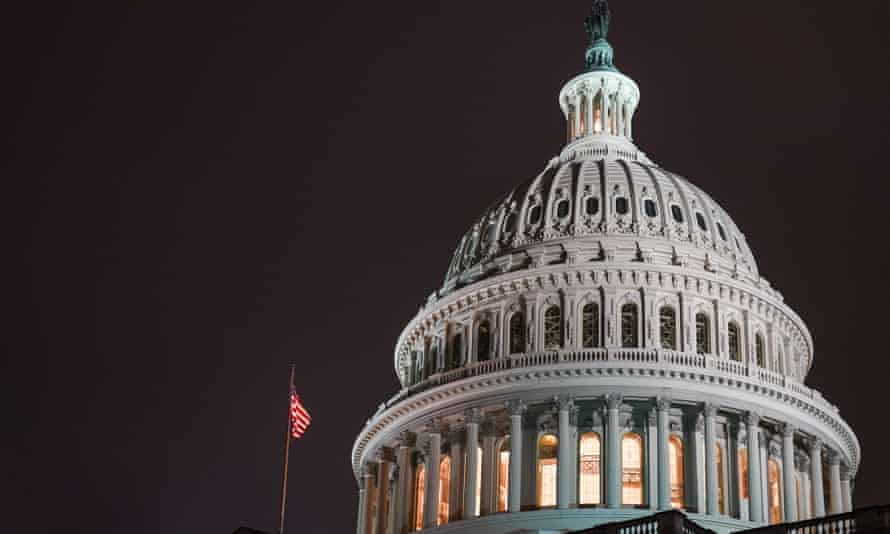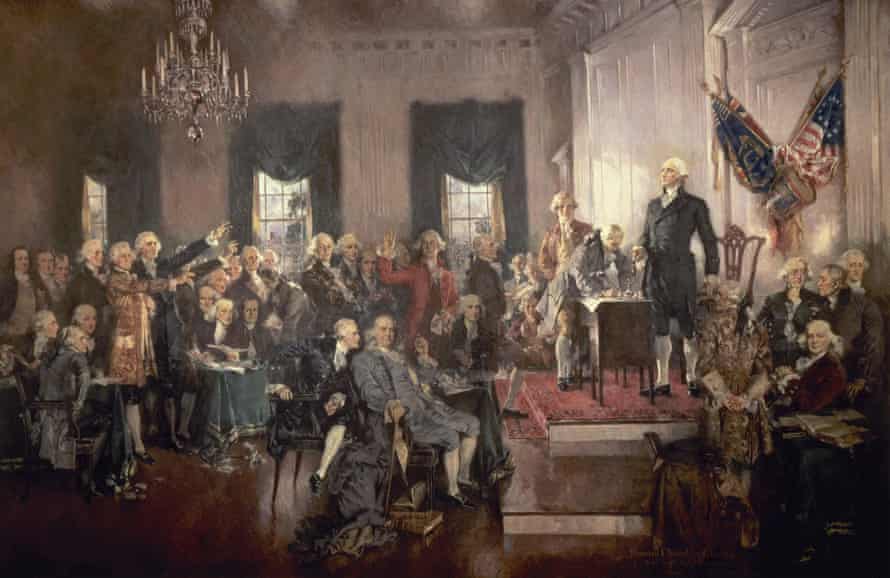Just how severe will America's minority rule become?
Outdated filibuster rules allow a small minority of the US population to hold the rest of the country hostage

“As everyone from President Joe Biden to the conservative Democratic senator Joe Manchin to liberal groups now push to reform the Senate’s rules, the defense of the filibuster goes something like this: by design, our nation is a republic, not a direct democracy, and therefore we must create institutional obstacles to empower a minority of Americans to prevent the whims of the majority from being too hastily enshrined in legislation. By this logic, we must keep the Senate’s cloture rule, which requires 60 of the Senate’s 100 members to end a filibuster and move a bill to a vote.
Those who make this case seem to love sounding like erudite constitutional scholars steeped in the grandeur of American history, and they purport to be pluralists worrying about minority rights.
“Letting the majority do everything it wants to is not what the founders had in mind,” said the Senate Republican whip, John Thune, in a floor speech defending the filibuster this week. “The founders recognized that it wasn’t just kings who could be tyrants. They knew majorities could be tyrants, too, and that a majority if unchecked could trample the rights of the minority … so the founders created the Senate as a check on the House of Representatives.”
But an inconvenient fact undermines Thune’s argument and should set pluralists at ease: even if the filibuster were eliminated and bills could advance on a simple majority vote, the Senate would still be giving a minority of the American population enough Senate representation to block legislation supported by the majority of the country.
In the debate over the filibuster, then, the question is not whether you believe the majority should rule. Instead, the question is this: how small a minority should be given legislative veto power over the rest of the country?
Back in 2010, the Republican Senate majority leader, Mitch McConnell, was not wrong when he said the founders were “quoted as saying at the constitutional convention the Senate was going to be like the saucer under the teacup, and the tea was going to slosh out and cool off”.
To that end, the founders created a Senate giving large and small states equal representation. The idea was for the upper chamber to act as a stately bulwark against the more uncouth ideas that could bubble up from the rabble and its representatives in the lower chamber. In the words of James Madison, the Senate’s undemocratic structure was designed as a “necessary fence” against “the impulse of sudden and violent passions” of the people.
In the modern era, the structure of the Senate has often turned the upper chamber into a place that does not merely respect minority rights – it has actually allowed the minority to rule, regardless of the status of the filibuster. As CNN’s Ronald Brownstein recounted last year, “While the [Republican party] has controlled the Senate for about 22 of the past 40 years, Republican senators have represented a majority of the nation’s population for only a single session over that period: from 1997 to 1998.”
Maybe you like this undemocratic dynamic, because you believe it represents the founders’ ideals. Maybe you hate this dynamic, because you believe it makes a mockery of democracy. Whichever side you are on, here’s the point that is germane to the renewed debate over Senate rules: even if the filibuster is eliminated, a minority of the American population will still retain disproportionate, outsized power in Congress’s upper chamber, just as the founders desired.
That is because under simple-majority voting rules, the majority of the country’s population does not necessarily rule the Senate. Even without the filibuster, the Senate is still a place where the 265,000 South Dakotans who elected Thune get as much representation as the 2.2 million Georgia voters who elected Raphael Warnock. Consequently, a filibuster-free Democratic Senate would still allow a minority of the population’s senators to rule, if they so choose – because the Senate still provides far less than half the country with the 51 votes necessary to stop any legislation in its tracks.
To understand how, let’s do some math.

Right now, the 50 Senate Democrats represent roughly 61% of the country’s population, according to census data. The 50 Senate Republicans represent just 49% of the population. All of the Republicans plus Manchin (the Democrat most likely to oppose progressive legislation) represent less than half the country’s population. And yet in a filibuster-free Senate, they could still use a simple-majority vote to stop anything pushed by 49 Senate Democrats who represent 61% of the country. (Note: the percentages don’t add up to 100 because six states have one Democratic and one Republican senator.)
If you happen to be one of those constitutional originalists worried about preserving the power of small states, don’t fret. The power imbalance becomes more pronounced when you take party out of the equation and just look at states with the least population. A whopping 52 senators from the least populated states currently represent just 17% of America’s total population – but they would still be able to stop all legislation in a filibuster-free Senate under simple-majority rules.
A different way to consider the situation is to think of each American being represented by two Senate votes. Right now, 49 Democrats represent 56% of all those votes. The Republican-Manchin caucus represents just 43% of all of those Senate votes. But again, even without the filibuster, conservatives would have 51 Senate votes to stop anything.
These numbers actually understate the situation. That’s because while senators technically represent their entire states, they only need half the voter turnout in their states to actually get into the Senate.
The point here is simple: no matter what is done with the filibuster, the much-worshiped “cooling saucer” is preserved, and every armchair constitutional scholar with a high self-regard will still get to smugly tell others we are a republic, not a democracy.
But these figures underscore not just that the filibuster can be safely discarded without trampling minority rights. They also spotlight how insane the filibuster actually is.
Using the same aforementioned math, the filibuster rules allowing 41 senators to halt legislation effectively empower a group of Republican senators representing just 22% percent of the population to gridlock the government. Again, considering that it only takes 50% of the vote to get elected, the filibuster means that about 11% of the voting-age population has successfully elected Republican senators who can theoretically block anything that polls show the overwhelming majority of the country might want.
Part of what makes the filibuster discourse so confusing is the differing definitions of “minority”.
When the founders created the Senate, they aimed to guarantee that the minority of the population still had rights – they didn’t care about the rights of political parties or factions (which many of them hated).
By contrast, when Republicans like Thune depict the filibuster as a noble bulwark protecting “minority rights”, he is not talking about protecting a minority of the population. He is talking about fortifying the power of the chamber’s minority political factions, regardless of how small a segment of the population those factions actually represent.
That’s a huge difference – and it helps explain the filibuster’s practical application.
Remember, the filibuster is not known as the instrument preventing the majority of the population from trampling the rights of racial or ethnic minorities. Quite the opposite: it has in practice empowered an ideologically conservative political faction to both deprive certain minority groups of their rights and block what the majority of the population wants.
When it comes to racial equality, Martin Luther King III noted in an op-ed this week: “The filibuster has historically been used as a tool to try to keep segregationist policies in place. In the 1920s, it was employed to stop anti-lynching legislation from moving forward. In the 1950s, Senator Strom Thurmond of South Carolina famously held the longest filibuster on record to delay, unsuccessfully, civil rights measures. And in a failed effort to block the Civil Rights Act of 1964, southern segregationists filibustered the bill for 60 working days.”
Similarly, think about the debate over firearm policy in the wake of yet more mass shootings. The Nation’s Ari Berman notes that after the Sandy Hook massacre, “bipartisan legislation requiring background checks for gun sales was supported by 86% of Americans and 54 senators but blocked by 46 senators representing just 38% of the country.”
In both cases, we see that Madison’s desire to restrict democracy in order to limit “the impulse of sudden and violent passions” of the public wrongly presumes that the only way those impulses are expressed is through the passage of new legislation. In practice, blocking legislation has been an equally pernicious expression of such volatile impulses and passions by a motivated but tiny segment of the population. The filibuster allows those impulses and passions to not just influence legislation but to wholly dominate public policy through that minority’s political factions.
In light of this history and the math of the Senate, proposals to merely reform the rules with half measures like a “talking filibuster” seem at best unnecessarily cautious, especially since the filibuster is now so routinely invoked to halt legislation.
Fully eliminating the filibuster would still allow a minority of the population to wield disproportionate power, because the chamber’s structure has baked-in rights for the minority of the population even in straight up-or-down vote situations.
Put another way: even without the filibuster, there can be a Senate majority party whose senators represent less than half the country. There can also be a transpartisan coalition of 51 senators who represent less than half the country and who can stop essentially anything.
The filibuster just makes this undemocratic system more undemocratic, in ways that cannot be justified. In the name of preventing a tyranny of the majority, it creates what I have called a tyranny of the tiny minority. It takes a House of Lords-style institution that has been rationalized by glib “we’re a republic, not a democracy” logic and transforms it into a cartoonishly undemocratic weapon of reactionary power.
The rationale for that transformation has amounted to vapid paeans to the founders. Everybody seems to have forgotten that Alexander Hamilton admitted: “To give a minority a negative upon the majority (which is always the case where more than a majority is requisite to a decision), is, in its tendency, to subject the sense of the greater number to that of the lesser.”
Even without the filibuster, the lesser number of the country will have more than enough Senate representation to express many of its political desires. Keeping the filibuster simply lets that lesser number completely rule everything.
David Sirota is a Guardian US columnist and an award-winning investigative journalist. He is an editor-at-large at Jacobin, and the founder of the Daily Poster. He served as Bernie Sanders’ presidential campaign speechwriter”
No comments:
Post a Comment